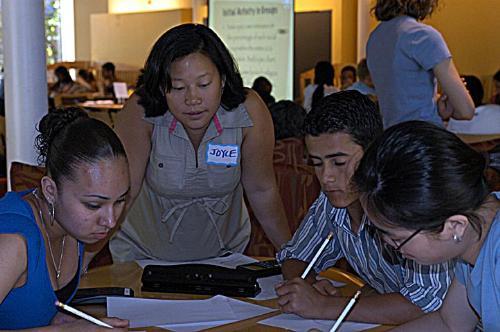
Students in Crimson Summer Academy, Harvard's new program directed to meet the needs of students from low-income households, worked in Ticknor Lounge. Crimson Summer Academy met for the first time Wednesday.
The students began trickling in at 7:45 a.m., 45 minutes before their program actually began.
“You get paid to learn. What’s better than that?” rising 10th-grader John Lewis asked Wednesday, as 30 high school sophomores converged on the Yard for the opening day of the Crimson Summer Academy, a new program for local low-income students.
The director of the three-summer-long educational and mentoring program, Maxine E. Rodbury, called the eagerness to begin orientation Wednesday “amazing” as she watched the students learn to use their new Apple iBook computers.
Along with the computers, and free tuition, the students will received a $200 weekly stipend during each of their three summers and a $3,000 scholarship upon successful completion.
The students come from 14 different local high schools and represent diverse ethnic groups, Rodbury said. To be selected, a student had to be nominated by a high school guidance counselor, submit an application that included essays and complete an interview, Rodbury said. This year, 110 applicants applied for the 30 spots.
“We were looking for highly motivated students who wanted to be part of a rigorous learning community,” said Rodbury, who directs the Harvard Writing Center during the academic year.
The program aims to accept 30 students entering 10th grade each year, Rodbury said, so that by 2006 there will be 90 total students in the program each summer.
Although the Summer Crimson Academy operates under the auspices of the summer school program, its offerings are wholly separate.
In the first summer of the program, students study a unique curriculum—the theme of which is “students as citizens”—at Harvard for four weeks.
Rodbury said the “students as citizens” theme is intended to make participants more aware of the ways in which they behave in the world and to provide interdisciplinary unity among the classes that will be taught.
Each day begins at 8:30 a.m., when Harvard undergraduates, or “mentors,” involved in the program give short presentations on citizenship, said mentor Adam C. Estes ’07.
Estes said the program’s definition of good citizenship encompasses making a positive contribution to the United States, one’s school and home.
Most mornings, all students will study quantitative reasoning and science and technology. Tuesdays, though, students will have a double period of digital photography.
Harvard is facilitating the study of that particular field by giving each of the students a new digital camera—which, along with the iBooks, are theirs to keep.
Lewis, who said that the free computer “makes you feel special,” added that he at least would not take the quantitative reasoning class lightly.
Read more in News
Mahan Unveils New Harvard-Yale Game Plan












